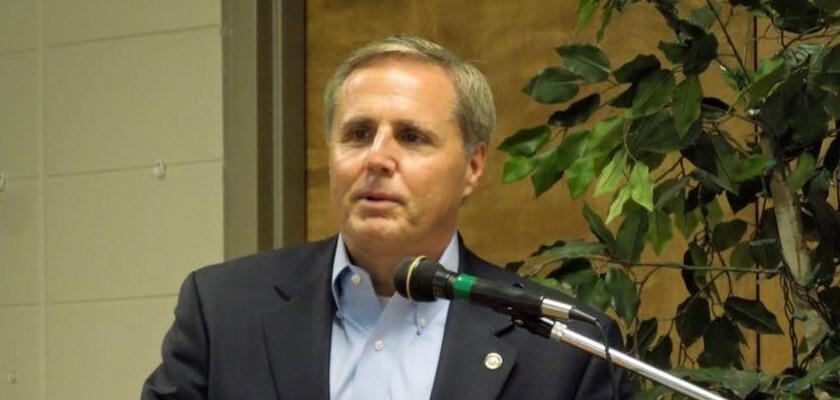BIRMINGHAM — State Rep. Danny Garrett (R-Trussville) said Thursday that he was "unsure" of what the state should do in response to the loss of gas tax revenue that would likely come with a transition to electric vehicles (EV).
Garrett is the lead chair of the Alabama House of Representatives Ways and Means Committee and a member of the Alabama Innovation Corporation Board. He participated in a panel discussion at the Drive Electric Alabama Electric Vehicle Summit at the Birmingham Jefferson Civic Center Complex.
Drive Electric Alabama is a statewide coalition that advocates for electric vehicles in the state. It is coordinated by the Alabama Department of Economic and Community Affairs (ADECA) and works with utility regulators, government officials and automakers.
ADECA director Kenneth Boswell, business development assistant director of the Alabama Department of Commerce (ALDC) Hollie Pegg and executive director of the Alabama Mobility and Power Center at the University of Alabama Michael Oatridge joined Garrett on the panel, which was moderated by the president of the Alabama Clean Fuels Coalition Michael Staley.
Staley asked the panelists questions about EV-related activity in the legislature, the economic impact of EVs, workforce development problems and EV charger grant programs.
The panelists agreed that the transition to EVs from gas-powered vehicles was on its way and that the government should do something to facilitate that transition.
Alabama raised its gas tax by 10 cents per gallon in 2019 to help fund infrastructure projects, which include building new roads. Additionally, an annual fee of $200 was placed on all-electric vehicles, and an annual fee of $100 was placed on hybrids. This way, electric vehicle owners, who contribute to wear and tear on the roads, are also contributing to road maintenance.
Garrett explained that Alabama roads are 100% financed by gas taxes. The gas taxes also obtain matching federal funding. He said that the tax was raised because since the last gas tax increase in the 1990s, cars have become more fuel efficient, thereby reducing revenue.
"We passed the 10-cent gas tax, which now puts us [at $300 million to $320 million] in additional funding," Garrett said. "When you put that in the federal match, you're putting about $1 billion in additional road funding in, and now you see Rebuild Alabama signs all over the state."
Garrett explained that the state could experience a hard drop in this revenue if EVs drastically reduced gasoline consumption, even with the EV fee.
"[The revenue from the EV fee] is projected to be as high as $100 million, assuming we have a wholesale adoption of electric vehicles. That's well short. That's 10% probably of the gasoline tax we currently collect," he added.
Garrett insisted that it was important for the state to adopt infrastructure for EVs but also figure out a way to fund it.
"We're going to have to figure out, what is that model to build roads in Alabama?" Garrett said. "Right now, we're going to have to replace really $1 billion in gasoline taxes with something. And I don't know what that's going to be, but there will be a lot of discussion about that."
Garrett said that when it comes to EVs, the Alabama Legislature needed to be focused on two things: educating the public about EVs and keeping auto manufacturers in Alabama.
"Unfortunately, this electric vehicle development has become a very political issue," Garrett stated. "And that's unfortunate because consumer behavior is changing. The economy is changing. We're transitioning to a knowledge-based economy … What we're doing is getting ahead of that consumer change. We're not talking about federal mandates or the Green New Deal."
Garrett said he bought a hybrid in 2013 and drove it until a few weeks ago, when he totaled it. He added that he noticed the demand for new hybrids when he went to get another one.
The Republican lawmaker cited the state's low labor participation rate as a reason to focus on improving workforce development and educational opportunities to supply the EV industry with qualified labor.
Before the first panel, Alabama Gov. Kay Ivey spoke at the event, supporting the adoption of EVs and praising Alabama for welcoming the nation's first graphite processing plant in the United States, which is located in Coosa County.
She said the plant would be able to source metal for ion-lithium batteries, typically produced in countries like China.
To connect with the author of this story, or to comment, email will.blakely@1819news.com or find him on Twitter and Facebook.
Don't miss out! Subscribe to our newsletter and get our top stories every weekday morning.










